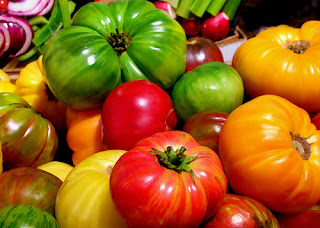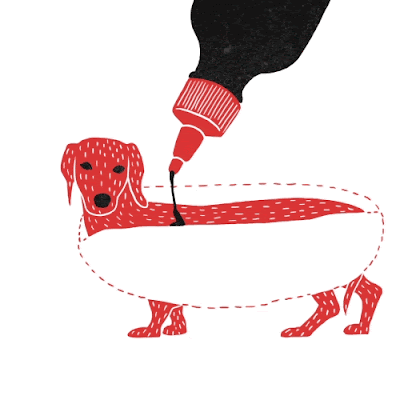New from NPR! 番茄淪喪實錄。雜交番茄形同嚼蠟
上圖為雜交前的番茄品種(各種形狀顏色都有)
據說滋味鮮甜好吃
人類是視覺動物,這樣的偏見影響我們的食物
這年頭經過基因改造genetically modified or engineered所種植而成的蔬果其實不在少數
NPR這篇報導告訴我們,原來當今我們吃的紅通通番茄
是基因突變種,味道其實不如雜交前的純種番茄heirloom tomato來得好
The moral of the story is : 雜交都沒有好下場 大家還是從一而終麻煩少
下回看到外表醜醜的番茄
請給它一個機會
尤其是上頭有點發綠的番茄
那才是鮮甜滋味的象徵
上圖為雜交且改良後的番茄(全身紅通通,不過滋味也挺普通)
(就是生吃的時候需要塞一顆話梅才會覺得比較甘酸甜的那種)
下載聲音檔請點我
番茄淪喪實錄
From NPR
Finally
this hour, a break from Supreme Court coverage. We're going to take a few
minutes to talk about the state of the modern tomato當今蕃茄的處境(狀況). Today, scientists revealed a small
but intriguing耐人尋味(有意思的)chapter in the story of the tomato,
a story, some would say, of its downfall向下沉淪. NPR's
Dan Charles explores how the tomato came to be so abundant量多, yet
lost so much of its taste.
DAN
CHARLES, BYLINE: We'll start with the old tomatoes, varieties that people grew
a century
or more ago. Some people still grow them, like Eric Rice at Country Pleasures
Farm near Middletown , Maryland
ERIC
RICE: Valencia , the one here
in the front, for example, is a tomato from Maine
CHARLES: It's been around,
he thinks, since
the early 1800s早在1800年左右就存在了. He grows others called Cherokee
Purple, Dr. Wyche and one called Mortgage Lifter.
RICE:
When I was in North Carolina, actually, I first started tasting heirloom tomatoes(透過純種蕃茄品種栽培的復古蕃茄,不經過雜交配種。英國稱之為heritage tomato)when I
was in graduate
school and decided I really liked them.
CHARLES:
He liked the
vivid taste滋味鮮實. He
liked the unusual
colors: yellow, orange, purple. Now, he grows them to sell to
customers at a farmers'
market農夫市集 in
Washington, D.C. But Rice admits all that tomato personality蕃茄品種的特質 can make heirlooms harder to grow and sell.
RICE:
Heirloom tomatoes don't ship very well很難運送 because
they're softer. And frankly, they are all different kinds of shapes and
sizes.
CHARLES:
So they're harder
to pack很難包裝. And
there's something else you'll notice as these tomatoes start to get ripe.
The part of the tomato near the stem, what's called the shoulder of the fruit接近莖部的前端部位, stays green longer.
RICE: I
think it is an issue for some consumers because folks do buy with their eyes,
and green shoulders also mean that it's not entirely ripe沒有完全熟透 or not as soft and as tasty there.
CHARLES:
Now, those green shoulders turn out to be surprisingly significant. In this
week's issue of the journal Science科學期刊,
scientists are reporting that when people eliminated剔除 them
from modern tomatoes, some of the tomato's taste disappeared too. This
is how it happened. Sometime before 1930, back when all tomato plants were
heirlooms, a tomato grower noticed a plant with distinctive fruit一個特殊的果實. These tomatoes turned red from stem to
tip從莖部到蒂頭都變紅 in a uniform way一致性, no green shoulders.
It was a
new genetic
mutation基因突變, and it
seemed like a great thing. Somebody saved seeds from that plant and
grew more. Plant breeders used those plants to crossbreed with other tomato
varieties to get rid of their green shoulders too. Ann Powell at the University of California ,
Davis
DR. ANN
POWELL: It's a little bit hard to find a variety that's in modern
production that doesn't have it.
CHARLES:
Powell is one of the scientists who now has discovered the genetic change
responsible for uniform ripening. She admits she sort of stumbled across it
by accident.意外發現的
POWELL:
The experiment was completely backwards in how we did it.
CHARLES:
She was looking at some genetically engineered tomato plants透過基因工程培育的植物 that were created so that
scientists could study the effects of different genes. Each plant
contained an added gene from another plant, a little weed野草 called Arabidopsis阿拉伯芥(一種屬於十字花科,會開花的野草) that plant scientists like to work
with. Powell noticed that one of these added genes resulted in green
tomatoes that were really dark green. It struck her as odd讓她覺得很奇怪.
POWELL:
The leaves
were not dark green. It was only the fruit that were dark green.
CHARLES:
Powell thought to herself this gene seems to have an interesting effect on how
tomato fruit ripens. I wonder if some tomato plants have their own version of
this dark-green gene. She and her colleagues looked for it, found it, and by coincidence巧合, so did some other researchers on
the other side of the country at Cornell University. They discovered that this
natural tomato gene, when it works properly, produces those green shoulders
on tomatoes. And the darker green color comes from extra chlorophyll多出來的葉綠素, which is what converts sunlight into sugars將陽光轉化為糖份 for the plant. In fact, those dark
green shoulders were making these old tomatoes sweeter and creating more
flavor. The uniform ripening mutation disabled this gene使這個基因失去能力(無法作用).
DR. HARRY
KLEE: We find out that, oh, my goodness, this is one of the factors that
actually has led to the deterioration of flavor走味(吃起來口感與滋味越來越差) in the commercial tomato.
CHARLES:
That's Harry Klee, a professor at the University of Florida
KLEE: You
know, so what I tell people is that we can get 100 percent of the flavor
and 80 percent of the agricultural performance of the modern varieties with
very little work.
CHARLES:
We can start with some of the best heirlooms and then bring in some of the disease
resistance genes that modern varieties have, increase yields增加收成的量 at least
a little bit. Consumers may have to change their expectations, Klee says. They
may have to get
used to tomatoes with green shoulders, for instance.
KLEE:
They're going to have to go in and say, oh, look, that one's got that little discoloration變色 at the top, that means it must be good.
CHARLES:
But these tomato plants probably won't produce as big a harvest, Klee says.
So the only way they're likely to show up in your local grocery store is if
consumers can recognize them and pay a little more for them.
Dan
Charles, NPR News.












留言
張貼留言